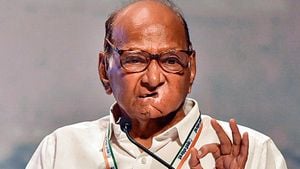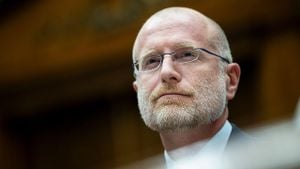With the political scene heating up again, the Virginia State Senate District 32 special election is garnering considerable attention. This race is particularly significant, as it will impact control of the tightly contested Virginia Senate. The upcoming election, scheduled for January 7, 2025, is poised to be one of the most pivotal moments affecting the state’s legislative agenda.
Democrats recently nominated Del. Kannan Srinivasan to represent their party in the special election. Srinivasan, who is currently serving as the representative for House District 26, won the party’s firehouse primary by securing 45% of the vote, totaling 2,698 out of 6,065 ballots cast. This places him as the successor to Congressman-elect Suhas Subramanyam, who held the Senate seat before resigning to serve in Congress. Subramanyam enthusiastically endorsed Srinivasan, emphasizing their aligned values and political goals.
Vying for the Republican spot, Tumay Harding, who has positioned herself as an advocate for what she calls “parents’ rights,” received her nomination on the same day. Harding’s campaign strategy heavily emphasizes education policy, tapping directly from the conservative sentiments surrounding parental control over school boards and curriculum content changes. Her previous attempt to secure a seat on the Loudoun County Board of Supervisors was unsuccessful, but she has returned to the political arena with renewed vigor.
The stakes of this race cannot be understated. Democrats currently hold a narrow lead with 21 seats compared to Republicans’ 19. If Harding wins the special election, which analysts predict is possible due to the traditionally competitive nature of the district, the Senate could end up with an equal split—20 Republicans and 20 Democrats. This would grant Republicans effective control through the tie-breaking vote of Lieutenant Governor Winsome Earle-Sears, who is positioned to be the deciding factor on key legislative matters.
This special election is also intricately tied to other major issues facing the Virginia legislature. Democrats have plans for advancing significant constitutional amendments this session, aiming to expand reproductive rights, bolster voting rights, and affirm marriage equality. Winning this seat would allow them to press forward with their legislative agenda. On the other hand, Republicans are eager to capitalize on momentum and oppose these initiatives should they gain control.
Several policy battles are anticipated, including those focused on technology, education potential, and social justice issues. The contrasting platforms of both candidates reflect sharper divisions over education reform, public safety, and healthcare funding, which resonate deeply with constituents.
The upcoming election will not be just about the candidates, but rather about the ideals and policies they endorse. For example, Harding's parents' rights platform sparks discussions on censorship and educational materials, bubbling toward fierce debates over what books are permitted within schools, who decides educational materials, and the broader impact of these choices on societal norms.
Another layer to the election's narrative is the role of money and resources backing each candidate. Campaign financing is poised to reflect the party lines drawn within this highly voter-motivated district, fostering expectations for substantial campaign spending focused on advertising, canvassing, and outreach.
This dynamic election reflects the broader political ecosystem, where both parties recognize how key this race could be—not only for the state of Virginia but as part of the national political chess game featuring 2024’s looming presidential race. It stands as both parties seek to set the narrative for their respective platforms in the years to come.
Harding and Srinivasan both know they won't just be appealing to their party bases but are also vying for the undecided voters. Each candidate's strategy will hinge on the ability to resonate with constituents across the political spectrum, addressing local issues directly impacting their day-to-day lives.
While voices within Democratic and Republican circles continue to echo their respective calls to action, the urgency for the election is palpable. Get ready, Virginia! This special election isn't merely about filling a seat; it's about the state’s political future. The campaigns are likely to intensify as candidates prepare for the final stretch leading up to January, promising voters more engagement and outreach initiatives.
Whoever emerges victorious from this politically charged contest will not only join the ranks of Virginia's Senate but will also play a strategic role in shaping the direction of future legislation. Whether they are committed to progressive policies or conservative positions, the impact of this election could echo throughout the state for years.



